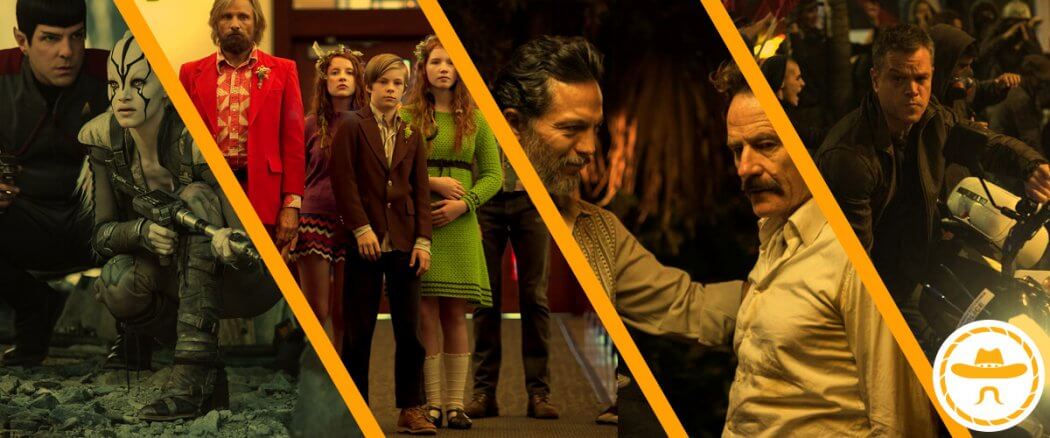At Cinema Faith, we wish we could provide feature-length reviews for every movie that hits theaters. Unfortunately, some films fall through the cracks. To compensate, we’re introducing a new series called “Mini-Review Roundup” where we present smaller reviews of several movies at once.
In this inaugural edition we review Star Trek Beyond, The Infiltrator, Jason Bourne, and Captain Fantastic.
Star Trek Beyond
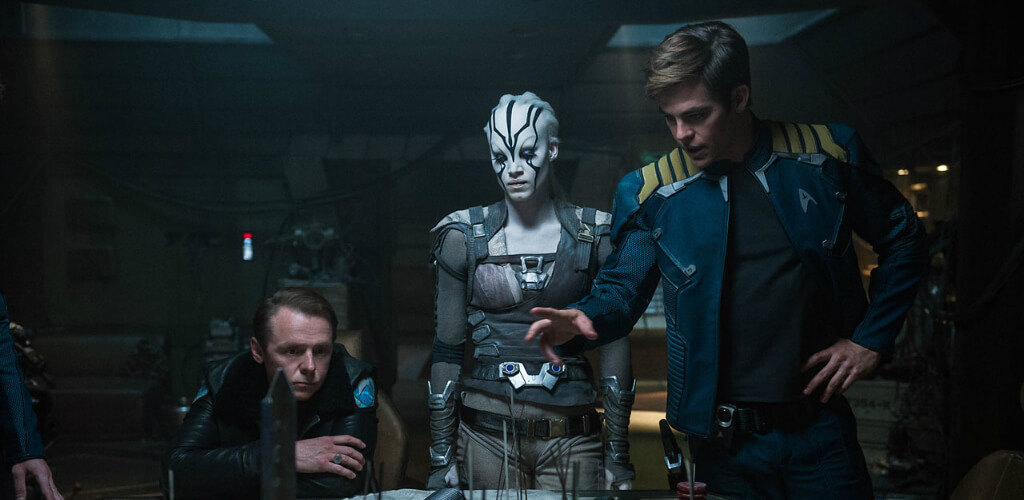
Some people say you can’t be a Star Trek fan and a Star Wars fan. I think there’s room at the table for both. Star Wars will always be closer to my heart. I grew up with it. My childhood orbited it. But when J.J. Abrams launched his Star Trek reboot six years ago, I was hooked from minute one. What makes Star Trek special is its boundless optimism. As the Enterprise warps from one galaxy to the next, there is always a new foe waiting to destroy them. But the Enterprise is more than a ship. The Enterprise is a glimpse of the best in all of us. This is a crew who honors each other. This is a crew ready to lay down their lives for the greater good.
Star Trek Beyond hits these themes straight on. The enemy they face knows the Federation well. He mocks their compassion and sacrifice. To him, these things are weaknesses. Might makes right. The ruthless prevail. And hey, he has a point. In the short term, brute strength is effective. The crew of the Enterprise is tested to the extreme in Beyond. They lose everything. But the short-term doesn’t concern them. They’re fixed on the next move; each piece working together, defending each other, until…checkmate.
All of this optimism might come across as old-fashioned hooey if it wasn’t for Chris Pine. His Captain Kirk is the energy these films need, and they wouldn’t work without him. He makes Star Trek modern and relevant, and Zachary Quinto’s Spock is his essential counterpoint. Unfortunately, this time they star in the rebooted franchise’s worst entry yet. Compared to the first two films, Beyond is a disappointment. Perhaps the switch in directors from Abrams to Justin Lin is to blame. I was never sold on the villain Krall (played by an unrecognizable Idris Elba). What makes him tick? What’s he really after? I still don’t know. The same holds true for the new character Jayla. They both feel like unfinished sketches. Furthermore, the action fails to reach the heights of the first two installments. There’s still a lot going on, but the tension is missing. The movie feels more like an old Star Trek TV episode than a big-budget summer blockbuster. The characters keep it watchable, but the world they inhabit is half-baked.
Thankfully, Simon Pegg (who co-wrote the film with Doug Jung) promises Beyond is not the end of a trilogy. There is still more to come. Here’s hoping Abrams returns to the director’s chair. I’ll watch these characters in anything, but they deserve a steadier hand. Abrams understands this universe. He’s the reason we fell in love with Star Trek again, and only he can make it live long and prosper.
Grade: B-
The Infiltrator
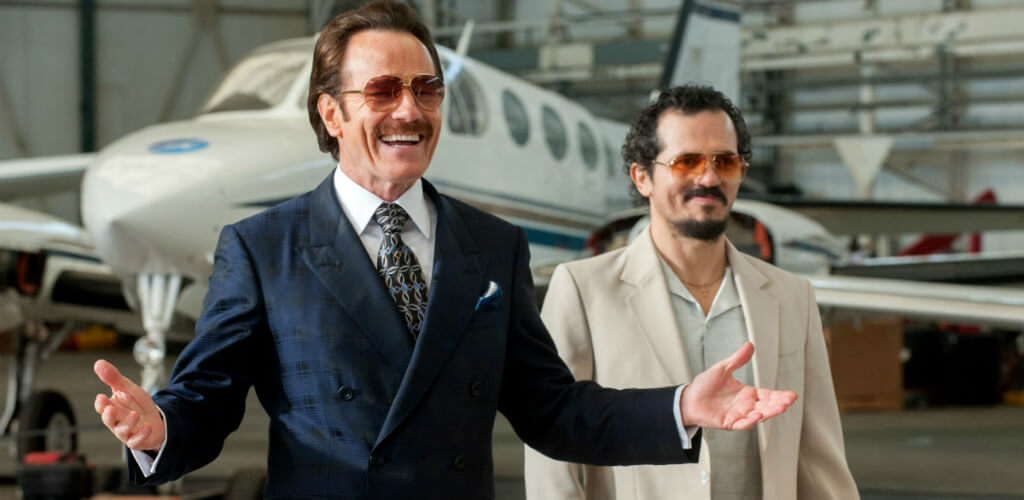
I’ll never forget a mantra my teacher taught us in film school: “If what’s happening in the scene is what’s really happening in the scene, we’re in deep crap.” He said crap because it was a Christian college, but his face betrayed something graver. We got the point. Film is all about subtext. No one wants to watch a man take a sip of soda. But what if the soda is poisoned? This is what makes undercover cop movies so compelling. The entire movie is subtext. Even the most mundane scenes are riveting because every moment could be the moment when the cat’s out of the bag.
The Infiltrator adds another layer of excitement because it’s based on a true story. There really was a man named Robert Mazur who infiltrated the highest levels of Pablo Escobar’s drug cartel. Mazur is still alive today. I wonder how he feels about being played by the great Bryan Cranston. Breaking Bad is starting to feel like a distant memory as Cranston cranks out one memorable role after another. Mazur is a family man, but his day job is anything but. He laughs and dances with violent sociopaths and then comes home to kiss his kids goodnight. Mazur’s wife tolerates his double life to a point, but she gets more than she bargained for on this assignment.
My favorite scene in the movie comes when Mazur takes his wife out to a restaurant for their anniversary. Just as their cake arrives, one of Pablo Escobar’s crew happens to walk by and recognize him. Mazur’s undercover persona isn’t married and he goes by a different name. Mazur has to switch from doting husband to evil thug in an instant as his wife looks on horrified. This scene cuts to the heart of the film. Can you pretend to be evil day and night without becoming evil yourself? This is a profession built on deceit. The more sincere you are, the more effective you are. Real relationships are built only to be betrayed in the end. The results speak for themselves, but it’s a high price to pay.
The Infiltrator isn’t perfect. The film feels choppy at times, and some of the characters need more depth. But John Leguizamo is a perfect live-wire as Mazur’s partner, and Cranston always brings the goods. Overall this is a fascinating character study of a man who puts everything on the line, even his family and soul, for the chance to do some good. Does the end justify the means? That’s not an easy question to answer, but it’s one you’ll be pondering long after the credits roll.
Grade: B+
Jason Bourne
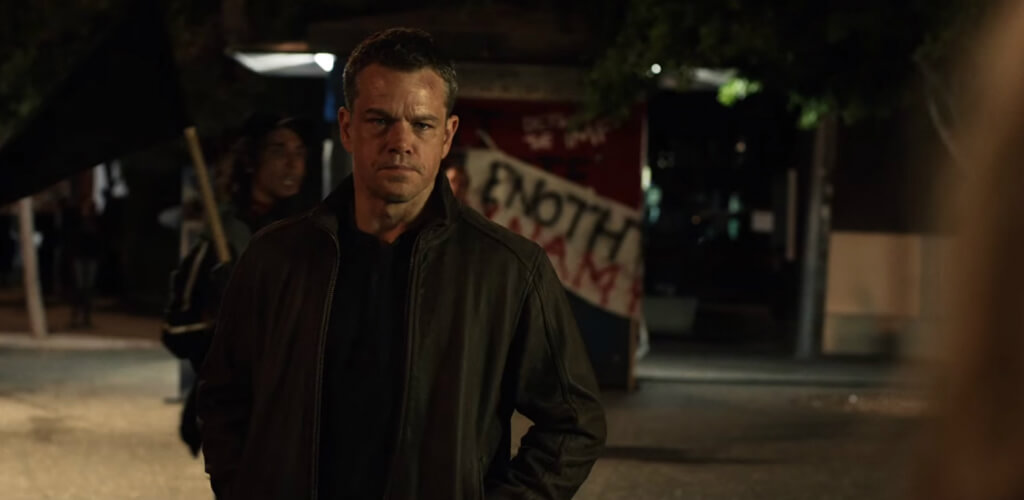
Jason Bourne or James Bond? The debate rages on every time a Bourne movie hits theaters. Do we want our heroes real and scrappy or suave and effortless? In reality, the argument lost its punch a long time ago, because Bourne changed Bond forever. When The Bourne Identity came on the scene in 2002, audiences fell in love with a new kind of hero. Bourne didn’t care about martinis. He was trying to figure out his life. Cartoonish action scenes were thrown out the window in favor of gritty, shaky-cam realism. The Bourne Supremacy doubled down in 2004 with director Paul Greengrass amping up the action in a way that felt even more authentic. So what happened when the James Bond reboot, Casino Royale, showed up in 2006? We got a Bond that felt like Bourne in a suit.
Now, after a 9-year absence, Bourne is back. And everything is different this time. Bourne races through city streets, dodges bullets, and scours computers all for…answers to his past. Okay, nothing is different, and that’s a shame. You’d think after 14 years Bourne would find something better to do than obsess over remembering things. Truth be told, it’s getting old. That being said, Jason Bourne is summer escapism at its finest.
Matt Damon clearly loves this character and he plays him well. His stoic face is always working things out, one step ahead, ready for anything. Greengrass is back at the helm and he delivers some terrific action scenes. Gritty car chases have become a Bourne staple and this one doesn’t disappoint. In fact, there’s more than one. Damon is also surrounded by a refreshing cast of newcomers. Alicia Vikander lets her hair down, fresh off an Oscar win, as the icy leader of the CIA CyberOps division. And Tommy Lee Jones shows up as the head of the CIA himself. Jones can play this character in his sleep, and yet somehow it works every time. He’s built to play powerful people in a suit. Easy paycheck or not, he’s one of the best things about the film.
Though Bourne is still lost in the past, the story driving him has modern relevance. The conflict involves a social media startup company that promises to uphold its user’s privacy while being approached by the government to betray that very trust. The movie raises some interesting questions about what the government has the right to know to keep us safe. On the one hand, what do I care if the President knows what I had for lunch? It’s a small price to pay for curbing terrorist threats. On the other hand, there will always be powerful people ready to take that information too far.
Bourne merely scratches the surface of these conversations, but that’s to be expected. This is Jason Bourne’s film. The best parts of the movie are when Bourne snaps out of his funk and pitches in to fight the present. I hope this continues in future installments. It’s time for Bourne to let go of his past for good. He needs an agency, a car, and a mission. He is, after all, the James Bond of the 21st century.
Grade: B
Captain Fantastic
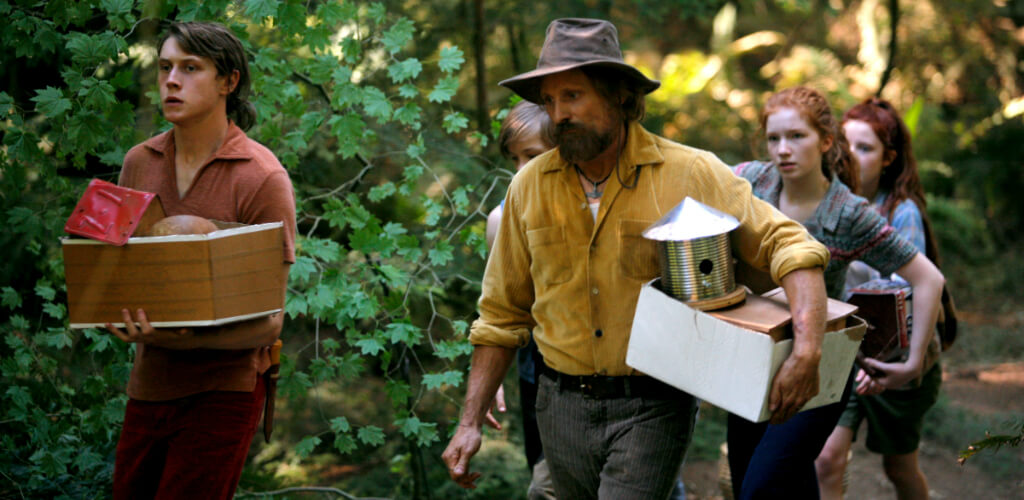
The title “Captain Fantastic” is either terrible or completely genius. The problem is everyone assumes this is a superhero movie. That’s not the case. Or is it? Viggo Mortenson plays Ben, a father with an unconventional parenting style. He lives in the middle of the woods with his six kids completely unplugged from modern-day conveniences. He teaches them to hunt, mountain climb, and take care of themselves in the harshest of conditions. But he also teaches them art, science, literature, music, and critical thinking. This is homeschooling on acid. His kids may know nothing of pop culture, but they have the physique of Olympic athletes and the academic knowledge of college professors.
Everything changes when Ben’s clan receives some terrible news that their mother is dead. She was sick and living in the city to undergo treatment. The family is suddenly forced to leave their idyllic home and take a journey into the real world to attend her funeral. That’s when Ben realizes that even the best of educations has its drawbacks. His kids may be the best and brightest, but they have the social IQ of infants. Ben also faces conflict from his wife’s side of the family who looks down on his parenting methods and even blames him, in part, for her passing.
There are so many things to love about this film. Mortenson is a revelation. You can’t help but admire what his character is trying to do. There are a string of wonderful scenes where Ben’s family clashes with modern relatives. The look of shock on his kids’ faces as they watch their cousins casually play a first-person shooter videogame is priceless. “What’s soda?” one of Ben’s kids inquires. “Poison water,” he replies. Ben can be arrogant about his parenting style, but it’s hard to argue with the results. Maybe Ben is a superhero after all.
Ben is critical of organized religion in the movie, especially Christians. This is ironic as Christianity, when lived out properly, provides everything Ben desires and more. Jesus instructs us to be in the world, but not of the world. Ben has much to teach us about the latter part, but we have things to teach him about the first. Living in a bubble is comforting, but also hollow and dangerous. How will we ever impact others, and grow ourselves, if we’re never around those who are different than us? We are relational beings meant for community, not isolation. Furthermore, even the best life free of modern trappings ends in death. The Gospel offers a life that starts now and lasts for eternity. It also eliminates the pride we see in Ben since our goodness is nothing more than a response to God’s grace.
And yet, we’re also called not to succumb to the world’s values. Excess, consumerism, gluttony, and greed are all things Ben strives against that the Church too often embraces. Ben is right to reject these things, and the freedom his family has because of it is tangible. Imagine a Church where both parts of Jesus’ prayer for his followers in John 17 were lived out; where all modern evil was rejected and our light shone bright, not outside the world but right smack dab in the middle of it through relationships and community. Ben is missing vital parts of this reality, but he’s farther along than many. As Jesus once said, this is a man not far from the Kingdom of God. Captain Fantastic is 2016’s best film yet.
Grade: A-

